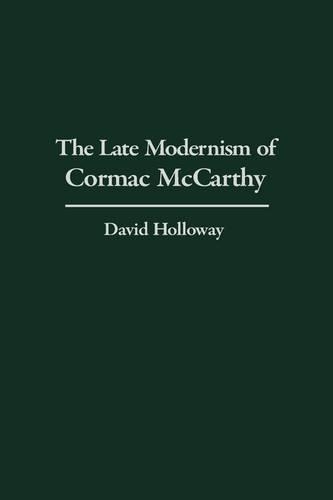
The Late Modernism of Cormac McCarthy
(Hardback)
Publishing Details
The Late Modernism of Cormac McCarthy
By (Author) David Holloway
Bloomsbury Publishing PLC
Praeger Publishers Inc
30th July 2002
United States
Classifications
Tertiary Education
Non Fiction
Literary studies: c 1900 to c 2000
Cultural studies
813.54
Physical Properties
Hardback
216
Width 156mm, Height 235mm
510g
Description
Offers a new interpretation of Cormac McCarthy's fiction in the context of modernist aesthetics. Through close examination of the formal as well as thematic organization of Cormac McCarthy's eight novels, this volume offers a radically new assessment of the work of an author who has often been described as one of the greatest contemporary American novelists. In opposition to existing McCarthy scholarship-which tends to concentrate on the regional dimensions of his work, viewing it within the literary and mythopoetic traditions of the South and Southwest-Holloway argues that McCarthy's full significance can only be understood if his work is contextualized within the broader political, economic, and intellectual discourses of the period in which his novels have been produced. Drawing on the ideas of Marxist thinkers such as Fredric Jameson, George Lukacs, and Jean-Paul Sartre, he shows how McCarthy's late modernism resists many of the postmodern assumptions about literary narrative that have come to shape our understanding of aesthetics in recent times.
Reviews
"David Holloway has written a book that will be invaluable to McCarthy scholars and to all those concerned with the status and function of narrative art and of literary criticism in the contemporary period. Writing from a broadly Marxist perspective, Holloway sites McCarthy's novels in a series of critical contexts that run from Lukacs to Jameson, and from Sartre to Derrida to Ecocriticism. The clarity and incisiveness of his work here is exemplary....Just as impressive, however, is Holloway's sensitivity to the nuances of McCarthy's language and to the formal strategies he uses. His readings of the individual texts, particularly of the Border Trilogy, and his analysis of the implications of McCarthy's developing style of 'optical democracy, ' are first rate. This is critical work of a high order."-Peter Messent University of Nottingham
"David Holloway's Marxian reading of McCarthy proves again just how rich and complex McCarthy's work is to support such a remarkable interrogation. Always the careful scholar, Holloway is also a courageous one, building on previous criticism in exciting and often provocative ways. Grounded in the solid, textual world of commodity and exchange, the book explores McCarthy's marvelous language, his sense of storytelling, and his contemplation of existential estrangement and spiritual transcendence with the critical rigor of the scholar and the avid appreciation of the engaged reader. Holloway points us all in new directions, and his work must be seen as essential to a fuller understanding of this astonishing artist."-Edwin T. Arnold Professor of English Appalachian State University
Author Bio
David Holloway is Lecturer in American Studies at the University of Derby, England. He has published scholarly articles and book chapters on 20th-century American literature and popular culture.
